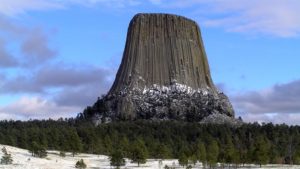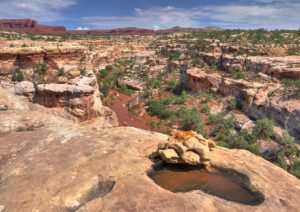Threats to National Monuments and Endangered Species Under Trump Administration
As the Trump administration officially takes control of the White House on Friday, there are a number of environmental policy changes and appointments that already have environmentalists pushing back. With media focus on the upcoming inauguration, it’s easy to miss some of these new developments. Luckily, Wild Virginia is here to keep you informed and up to speed. Today, we will cover threats to the Antiquities Act and the Endangered Species Act.
The Antiquities Act
The Antiquities Act, which gives the president power to designate land as national monuments without congressional approval, is

under attack by a group of senators lead by Lisa Murkowski (R-Alaska). The group of 26 senators is proposing an amendment to the Antiquities Act that would require extra steps before a president can designate land as a national monument:
- Congress must approve the designation. This means that the president must wait for congressional approval–which often means long voting periods and partisan conflict–before setting aside land for conservation.
- The state containing the potential conservation land must also approve the designation before the land can become a national monument. When the monument in question is located offshore (aka ocean acreage), then all states within 100 miles of the monument must approve the appointment. This means more waiting, more fighting, and less likelihood of the land being protected from drilling for oil or fracking for gas.
- The president must prove that the appointment of a national monument is within the guidelines of the National Environmental Policy Act, which requires environmental assessments and impact statements before environmental policy can be set in motion. Again, this means more waiting, more arguments, and more chances for the monument appointment to be thwarted.

The Antiquities Act is one of the most powerful tools a president has to protect the environment, and almost every president has exercised this power since the bill passed in 1907. The current fight against the Act is in response to President Obama’s latest designation of Bears Ears and Gold Butte National Monuments, pushing his total land conservation to 554 million acres over the last eight years.

Some see the designation of these national monuments as no more than Federal Government land grabs, that threaten the rights and livelihoods of local residents who do not have a say. However, Obama’s monument designations do not change current grazing permits, water rights, or fish or wildlife management. They do not limit use of the land by residents. The designations simply make the land off limits to further oil and gas exploration, which is a critical step in the fight to reverse the effects of climate change.
Threats to the Endangered Species Act
Conservatives and some Democrats, are pushing to make changes to the Endangered Species Act. These changes would greatly limit the Act’s influence. This monumental law, passed in 1973 to restore the declining bald eagle population, has been critical to the protection of species threatened by human development and habitat loss. Many of the species on the endangered list rely on conservation efforts for survival, and the Act has prevented the extinction of almost all of the 1,600 plants and animals on its list.
Some see the Act as a means for the Federal Government to take control of lands and block efforts to revive the economy and create new jobs. The Act allows large areas of land that contain critical habitat and endangered species to be made “off-limits” to human development. This means no drilling, logging, fracking, or deforestation.
Reforms proposed to the Act include limiting the number of species that can be listed as endangered at one time, removing a species from the list for every new one added, focusing on only one species’ rehabilitation at a time, and putting limits on lawsuits used to protect land. What many of these proposals boil down to is placing resource extraction and energy infrastructure ahead of wildlife protection for at least the next four years.
An Lesson from a Salt Marsh
When species begin going extinct in large numbers, it means something is seriously out of balance in the natural ecosystems where they live. When those ecosystems are out of balance, it means they are not functioning the way they should be. This has consequences for humans too. Take salt marshes as an example: salt marshes may not be the prettiest ecosystem with the cutest animals–think lots of fish and bugs and stinky mud–but they play a critical role in protecting human health.

As coastal wetlands, salt marshes mitigate rising sea levels and weaken storm surges to prevent coastal flooding. Their tall grasses and sticky, organic mud trap pollution and sediments from the water, helping to make the ocean cleaner and its inhabitants healthier. Salt marshes are also natural nurseries for fish, which is especially important as we continue to overfish and pollute the ocean. Fish are a major part of the human diet all over the world, so coastal wetlands are crucial sources of food to humans. But when insects and invertebrates start to go extinct, it means less food for hatchling fish. Fewer fish means fewer waterfowl and less food for humans. And without the wildlife to keep plants, sediments, and soil microbes in balance, salt marshes begin to collapse too.
The ecosystems protected under the Endangered Species Act are important to humans for more than just their gas or coal. They are important for the food, clean air, and clean water they provide. They are necessary as climate sinks to reduce atmospheric carbon and slow the effects of climate change. If the Endangered Species Act is limited or repealed, humans will lose the wide range of services these coastal wetlands mountains and great plains provide.
Some see Donald Trump’s incoming presidency as their chance to roll back environmental policies that are “blocking economic development.” To these decision makers, the Antiquities Act and Endangered Species Act are roadblocks to oil, gas, and coal industries, and must be repealed under the guise of protecting the working class American. But as we see climate change having more immediate impacts with record breaking annual temperatures and increasing numbers of severe storms, promoting coal, gas, and oil production hurts every American.
What is needed is a shift to renewable energy sources, which have the potential to create thousands of new jobs if embraced with the same enthusiasm as oil and coal in past decades. It is more important now than ever that people get involved at the grassroots level to have their voice heard, and show this new administration that climate change matters.
